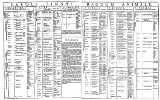
Zoology
Overview
Zoology is the branch of biology
that relates to the animal kingdom, including the structure, embryology, evolution
, classification
, habits
, and distribution of all animal
s, both living and extinct
. The term is derived from Ancient Greek
ζῷον (zōon, “animal”) + λόγος (logos, “knowledge”).
The history of zoology traces the study of the animal kingdom
from ancient to modern
times.
Biology
Biology is a natural science concerned with the study of life and living organisms, including their structure, function, growth, origin, evolution, distribution, and taxonomy. Biology is a vast subject containing many subdivisions, topics, and disciplines...
that relates to the animal kingdom, including the structure, embryology, evolution
Evolution
Evolution is any change across successive generations in the heritable characteristics of biological populations. Evolutionary processes give rise to diversity at every level of biological organisation, including species, individual organisms and molecules such as DNA and proteins.Life on Earth...
, classification
Biological classification
Biological classification, or scientific classification in biology, is a method to group and categorize organisms by biological type, such as genus or species. Biological classification is part of scientific taxonomy....
, habits
Ethology
Ethology is the scientific study of animal behavior, and a sub-topic of zoology....
, and distribution of all animal
Animal
Animals are a major group of multicellular, eukaryotic organisms of the kingdom Animalia or Metazoa. Their body plan eventually becomes fixed as they develop, although some undergo a process of metamorphosis later on in their life. Most animals are motile, meaning they can move spontaneously and...
s, both living and extinct
Extinction
In biology and ecology, extinction is the end of an organism or of a group of organisms , normally a species. The moment of extinction is generally considered to be the death of the last individual of the species, although the capacity to breed and recover may have been lost before this point...
. The term is derived from Ancient Greek
Ancient Greek
Ancient Greek is the stage of the Greek language in the periods spanning the times c. 9th–6th centuries BC, , c. 5th–4th centuries BC , and the c. 3rd century BC – 6th century AD of ancient Greece and the ancient world; being predated in the 2nd millennium BC by Mycenaean Greek...
ζῷον (zōon, “animal”) + λόγος (logos, “knowledge”).
- Main articles: History of zoology (through 1859), History of zoology (since 1859)History of zoology (since 1859)This article considers the history of zoology since the theory of evolution by natural selection proposed by Charles Darwin in 1859.Charles Darwin gave new direction to morphology and physiology, by uniting them in a common biological theory: the theory of organic evolution...
The history of zoology traces the study of the animal kingdom
Animal
Animals are a major group of multicellular, eukaryotic organisms of the kingdom Animalia or Metazoa. Their body plan eventually becomes fixed as they develop, although some undergo a process of metamorphosis later on in their life. Most animals are motile, meaning they can move spontaneously and...
from ancient to modern
Modernity
Modernity typically refers to a post-traditional, post-medieval historical period, one marked by the move from feudalism toward capitalism, industrialization, secularization, rationalization, the nation-state and its constituent institutions and forms of surveillance...
times.

